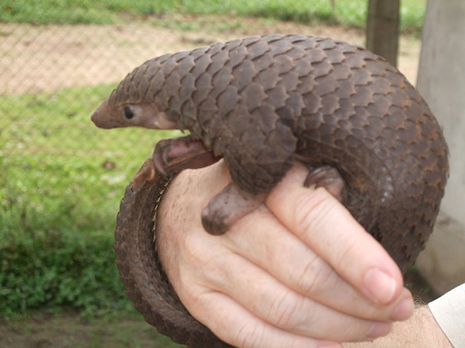Cambridge-led study reveals scale of pangolin trafficking
Seizures of pangolin scales have often been accompanied by thousands of kilos of ivory pointing to established smuggling connections

A team of conservationists, led by the University of Cambridge, has produced the first data-driven study quantifying Nigeria-linked seizures of pangolin products.
Between 2010 and September 2021, 190,407 kilos of pangolin scales were taken from at least 799,343 of the animals, but potentially up to almost a million creatures are dead due to the smuggling.
This figure is close to recent estimates for the entire global pangolin trade since 2000, suggesting levels of trafficking are far higher than previously thought.
The scales were taken from shipments intercepted and reported by authorities in ports across the world. Some seizures occurred in ports, such as Hong Kong, after leaving African shores.
Researchers traced cargo, from countries such as Cameroon and Gabon, that was destined for Asian nations including China and Cambodia, sometimes travelling via France and Holland. All had been funnelled through Nigeria.
26 of the 77 seizures were uncovered alongside thousands of kilos of ivory, pointing to the possibility of pangolin traffickers using long-established ivory-smuggling networks.
Although there have been improvements in limiting smuggling, researchers say that overall enforcement in Nigeria is lax and that corruption is endemic. Total prosecutions for pangolin trafficking in Nigeria amount to just four – all in the last year. The fact that so few are prosecuted suggests that seized shipments represent a small fraction of the pangolin product now moved through Nigeria.
The study, published in Biological Conservation, cites experts suggesting that detected wildlife seizures are anywhere from 30% to just 2% of the overall illegal trade.
“The figures in our research suggest there has been a gross underestimation of the scale of pangolin trafficking in Nigeria and indeed Africa as a whole, which could translate into mismatched anti-trafficking policies,” said lead researcher Charles Emogor from Cambridge’s Department of Zoology.
Pangolins, sometimes dubbed the “most trafficked mammal”, have large, protective keratin scales, similar in material to fingernails and toenails, covering their skin. They are the only known mammals with this feature.
Pangolins are in demand because of the false belief in the curative power of their scales. In addition, in parts of Asia eating pangolin meat is considered a status symbol.
In China, for example, ground-up scales are used in traditional medicine, although the country recently announced that it will be moving to de-list them as an approved official ingredient.
Pangolin bodies are illegally traded at markets across China, and some studies, including a recent one from Cambridge, have implicated the sale of the animal’s meat in the origins of the COVID-19 pandemic.
All eight pangolin species – four African, four Asian – are listed as threatened, with three now considered critically endangered. Researchers randomly sampled dozens of sacks impounded by customs, and estimated that some 90% of the scales involved in Nigeria-linked trade are from white-bellied pangolins.
 News / Eight Cambridge researchers awarded €17m in ERC research grants27 December 2025
News / Eight Cambridge researchers awarded €17m in ERC research grants27 December 2025 News / Downing investigates ‘mysterious’ underground burial vault 29 December 2025
News / Downing investigates ‘mysterious’ underground burial vault 29 December 2025 Lifestyle / Ask Auntie Alice29 December 2025
Lifestyle / Ask Auntie Alice29 December 2025 Sport / Hard work, heartbreak and hope: international gymnast Maddie Marshall’s journey 29 December 2025
Sport / Hard work, heartbreak and hope: international gymnast Maddie Marshall’s journey 29 December 2025 News / News in Brief: carols, card games, and canine calamities28 December 2025
News / News in Brief: carols, card games, and canine calamities28 December 2025







